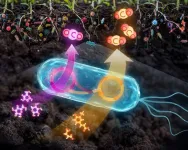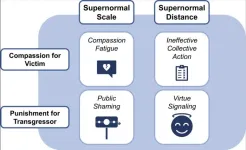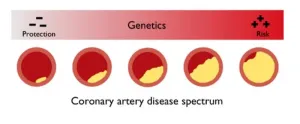(Press-News.org)
When soil microbes eat plant matter, the digested food follows one of two pathways. Either the microbe uses the food to build its own body, or it respires its meal as carbon dioxide (CO2) into the atmosphere.
Now, a Northwestern University-led research team has, for the first time, tracked the pathways of a mixture of plant waste as it moves through bacteria’s metabolism to contribute to atmospheric CO2. The researchers discovered that microbes respire three times as much CO2 from lignin carbons (non-sugar aromatic units) compared to cellulose carbons (glucose sugar units), which both add structure and support to plants’ cellular walls.
These findings help disentangle the role of microbes in soil carbon cycling — information that could help improve predictions of how carbon in soil will affect climate change.
The research will be published on Tuesday (June 11) in the journal Environmental Science & Technology.
“The carbon pool that’s stored in soil is about 10 times the amount that’s in the atmosphere,” said Northwestern University’s Ludmilla Aristilde, who led the study. “What happens to this reservoir will have an enormous impact on the planet. Because microbes can unlock this carbon and turn it into atmospheric CO2, there is a huge interest in understanding how they metabolize plant waste. As temperatures rise, more organic matter of different types will become available in soil. That will affect the amount of CO2 that is emitted from microbial activities.”
An expert in the dynamics of organics in environmental processes, Aristilde is an associate professor of civil and environmental engineering at Northwestern’s McCormick School of Engineering and is a member of the Center for Synthetic Biology and of the Paula M. Trienens Institute for Sustainability and Energy. Caroll Mendonca, a former Ph.D. candidate in Aristilde’s laboratory, is the paper’s first author. The study includes collaborators from the University of Chicago.
‘Not all pathways are created equally’
The new study builds upon ongoing work in Aristilde’s laboratory to understand how soil stores — or releases — carbon. Although previous researchers typically tracked how broken-down compounds from plant matter move individually through bacteria, Aristilde’s team instead used a mixture of these compounds to represent what bacteria are exposed to in the natural environment. Then, to track how different plant derivatives moved through a bacterium’s metabolism, the researchers tagged individual carbon atoms with isotope labels.
“Isotope labeling allowed us to track carbon atoms specific to each compound type inside the cell,” Aristilde said. “By tracking the carbon routes, we were able to capture their paths in the metabolism. That is important because not all pathways are created equally in terms of producing carbon dioxide.”
Sugar carbons in cellulose, for example, traveled through glycolytic and pentose-phosphate pathways. These pathways lead to metabolic reactions that convert digested matter into carbons to make DNA and proteins, which build the microbe’s own biomass. But aromatic, non-sugar carbons from lignin traveled a different route — through the tricarboxylic acid cycle.
“The tricarboxylic acid cycle exists in all forms of life,” Aristilde said. “It exists in plants, microbes, animals and humans. While this cycle also produces precursors for proteins, it contains several reactions that produce CO2. Most of the CO2 that gets respired from metabolism comes from this pathway.”
Expanding the findings
After tracking the routes of metabolism, Aristilde and her team performed quantitative analysis to determine the amount of CO2 produced from different types of plant matter. After consuming a mixture of plant matter, microbes respired three times as much CO2 from carbons derived from lignin compared to carbons derived from cellulose.
“Even though microbes consume these carbons at the same time, the amount of CO2 generated from each carbon type is disproportionate,” Aristilde said. “That’s because the carbon is processed via two different metabolic pathways.”
In the initial experiments, Aristilde and her team used Pseudomonas putida, a common soil bacterium with a versatile metabolism. Curious to see if their findings applied to other bacteria, the researchers studied data from previous experiments in scientific literature. They found the same relationship they discovered among plant matter, metabolism and CO2 manifested in other soil bacteria.
“We propose a new metabolism-guided perspective for thinking about how different carbon structures accessible to soil microbes are processed,” Aristilde said. “That will be key in helping us predict what will happen with the soil carbon cycle with a changing climate.”
The study, “Disproportionate carbon dioxide efflux in bacterial metabolic pathways for different organic substrates leads to variable contribution to carbon use efficiency,” was supported by the National Science Foundation (grant numbers CBET-1653092 and CBET-2022854).
END
In a Review article, Claire Robertson and colleagues explore how human morality, which evolved in the context of small in-person groups, functions on the internet with over five billion users. Evolved human responses, such as compassion for victims and urges to punish transgressors, operate differently online, the authors argue. The internet exposes users to large quantities of extreme morally relevant stimuli in the form of 24-hour news and intentionally outrageous content from sometimes physically distant locations. Subjecting human brains to this ...
Consumer data shows people with obesity are more price-sensitive than others when it comes to buying unhealthy foods, suggesting a food tax could be an effective public health measure. Taxes on sugar-sweetened beverages have become a commonly employed policy to improve public health. Less common are taxes on unhealthy foods, such as candy, cookies, or potato chips--and there is little data on whether such taxes would improve public health. Ying Bao and colleagues examined whether individuals of various ...
In the 2021–2022 school year, schools banned books more often than ever before in United States history. Katie Spoon, Isabelle Langrock, and colleagues analyzed data from PEN America on 2,532 book bans that occurred during the year, in combination with county-level administrative data, book sales data, and a novel crowd-sourced dataset of author demographic information. The research team found that people of color are several times more likely to be the authors of banned books than White authors and that a considerable proportion of banned books, both fictional and historical, feature characters of color. About 37% of banned books were children’s ...
Patients with pre-diabetes and severe obesity who had metabolic and bariatric surgery were 20-times less likely to develop full-blown type 2 diabetes over the course of 15 years than patients with the condition who did not have surgery, according to a new study* presented today at the American Society for Metabolic and Bariatric Surgery (ASMBS) 2024 Annual Scientific Meeting.
Only 1.8% of patients progressed to a diagnosis of diabetes in five years after metabolic surgery (Roux-en-Y gastric bypass or sleeve gastrectomy), which rose to 3.3% in 10 years and 6.7% after 15 years. The protective effect against diabetes was higher ...
SAN DIEGO – June 11, 2024 – Two new studies* presented today at the American Society for Metabolic and Bariatric Surgery (ASMBS) 2024 Annual Scientific Meeting suggest total robotic metabolic and bariatric surgery may result in shorter operative times, reduced lengths of stay and lower complications compared to laparoscopic approaches.
In one study, researchers from AdventHealth in Celebration, FL examined the outcomes of a single surgeon who performed 809 metabolic and bariatric operations – 498 totally robotic and 311 laparoscopic -- between 2020 and 2023. They found total robotic Roux-en-Y gastric bypass (RYGB) resulted in significantly shorter ...
SAN DIEGO – June 11, 2024 – Systematic reviews* of medical literature between 2020 to 2024 show bariatric surgery, also known as metabolic or weight-loss surgery, produces the greatest and most sustained weight loss compared to GLP-1 receptor agonists and lifestyle interventions. The study was presented today at the American Society for Metabolic and Bariatric Surgery (ASMBS) 2024 Annual Scientific Meeting.
Researchers found lifestyle interventions such as diet and exercise resulted in an average weight loss of 7.4% but that weight was generally regained within 4.1 years. GLP-1s and metabolic ...
PULLMAN, Wash. – Who proposes a bill matters more to Republican men than what it says—at least when it comes to the environment, a recent study found.
In an experiment with 800 adults, researchers used an article describing a hypothetical U.S. Senate bill about funding state programs to reduce water pollution to test partisan preferences, changing only the political affiliation of the proposal’s sponsors. Democrats in the study who favored the proposal supported the legislation no matter who proposed it and at higher levels than the Republican participants. Republicans’ support varied, however, dropping about 18% when it was described as being ...
A new study has revealed significant progress in the drive to reduce levels in the atmosphere of chemicals that destroy Earth’s ozone layer, confirming the success of historic regulations limiting their production.
The findings, led by the University of Bristol and published today in Nature Climate Change, show for the first time a notable decline in the atmospheric levels of potent ozone-depleting substances (ODS), called hydrochlorofluorocarbons (HCFCs). These HCFCs are also harmful greenhouse gases, so a reduction should also lessen global warming.
The Montreal Protocol was agreed to internationally in 1987 to introduce controls on the production and usage of ODS, which were once ...
New York, NY [June 11, 2024]—Using an advanced artificial intelligence tool, researchers at the Icahn School of Medicine at Mount Sinai have identified rare coding variants in 17 genes that shed light on the molecular basis of coronary artery disease (CAD), the leading cause of morbidity and mortality worldwide.
The discoveries, detailed in the June 11 online issue of Nature Genetics [DOI: 10.1038/s41588-024-01791-x], reveal genetic factors impacting heart disease that open new avenues for targeted treatments and personalized approaches to cardiovascular care.
The investigators used an in silico, or computer-derived, score for coronary artery disease (ISCAD) ...
Peer-reviewed – observational study - cells
A common type of ocean algae plays a significant role in producing a massively abundant compound that helps cool the Earth’s climate, new research has discovered.
The findings of the study by the University of East Anglia (UEA) and Ocean University of China (OUC) could change our understanding of how these tiny marine organisms impact our planet.
The team identified the bloom-forming Pelagophyceae algae as potentially abundant and important producers ...




